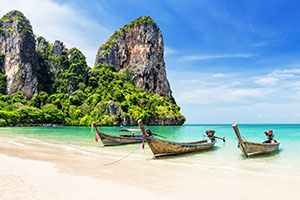Globus
What’s the most important thing to bring on a journey to Vietnam and Cambodia? Your bargaining skills! The art of haggling is a must at the bustling markets of Hanoi, Siem Reap, and Ho Chi Minh City where you can negotiate everything from luxurious silk to brightly painted ceramics to a tasty bowl of pho. The number one rule of thumb-always be willing to walk away. Luckily, there’s so much to walk toward on this extraordinary tour of Southeast Asia, including the fascinating wartime tunnels of Cu Chi, a fishing lesson on the Thu Bon River, and a breezy cyclo ride around the vibrant city of Hanoi. The picturesque pagodas of Hue and Hanoi are just a taste of what’s to come at the mystical temples of Angkor. Inside the "City of the God Kings," you’ll find the architecturally magnificent ruins of Angkor Wat delightfully much more than you bargained for.
Balance the high energy of Bangkok with the calming force of Chiang Mai by adding this extension to your Southeast Asia tour. In Bangkok, you’ll cruise through its famous klongs, visit calming Buddhist temples, and experience its vibrant city life. Then fly to Chiang Mai, where you’ll explore temples and visit an amazing elephant sanctuary to learn about the conservation efforts of orphaned and rescued elephants!
Featured Destinations
Bangkok
Bangkok
Bangkok is chief port capital of Thailand and one of the most important cities in Southeast Asia. It is the epitome of the country's kaleidoscopic blend of old and new. It is an expression of Thai respect for tradition coupled with their vibrant involvement with modern progress. Rama I built the walled Grand Palace, which contains Temple of the Emerald Buddha. During the 19th century, Bangkok was known as the Venice of the East because of its many canals, which served as streets and commercial thoroughfares. Houses perched along the banks of the remaining canals are still common sight. Some of Bangkok’s most distinctive features are the approximately 400 Buddhist temples, known as wats. Bangkok is Thailand's economic center. Other sights to see include Temples, monuments, museums, Vimarnmekh Mansion, and Jim Thompson’s House.
|
Destination Guide
|
Hoi An
Hoi An
Hoi An is an ancient port town that was designated an UNESCO World Heritage site. It is one of the rare places in Vietnam to discover genuine Vietnamese architecture. Walk through the Old Quarter and get a glimpse of a medieval Vietnam that no longer exists in the other areas of the country. Visit the Phuc Kien Pagoda, the 400-year-old Japanese Covered Bridge and the colorful bazaar
|
Destination Guide
|
Chiang Mai
Chiang Mai
Chiang Mai is a city built on the roots of a traditional heritage that dig deep into the soil of time. It's a city with a beautiful cultural personality of its own. In addition, it's been blessed with much majestic beauty in nature. The people themselves are an unforgettable part of Chiang Mai. Handicrafts of silk, silver and wood are timeless souvenirs for visitors from all over the globe.
|
Destination Guide
|
Halong Bay (Hanoi)
Halong Bay (Hanoi)
Meaning “Bay of the Descending Dragon,” Halong Bay’s water is calm and undisturbed despite the jutting limestone mountains that soar out of the water and toward the sky. As if a tail of a Dragon plunged into the earth, the mountains are craggy, sharp, and barren, and are dotted with thousands of small caves of various depths and heights. At dusk, they all take on mysterious shades of gray, mauve and olive, lending credence to the local legends.
|
Destination Guide
|
Siem Reap
Siem Reap
The small provincial capital of Siem Reap stretches along the Siem Reap river – surrounded by rice paddies and serving as the gateway to centuries-old temple ruins of the Khmer Empire. Designated a World Heritage Site by UNESCO, Angkor Archaeological Park contains numerous temple ruins including Bayon, Banteay Srey and legendary Angkor Wat. Those visiting the site stay in Siem Reap. Experience some local flavor, attend a dance performance, or shop in some local craft shops. Angkor Wat’s artistic and archaeological significance rivals the Pyramids in Egypt, Machu Picchu in Peru and the Taj Mahal in India. Unspoiled by over-development, many areas of the area are possible to explore away from crowds. Its three-tiered massive pyramid is crowned by five beehive-like towers on the ground. It is the centerpiece of any visit to temples in Angkor. This amazing structure is thought to be dedicated to the Hindu god, Vishnu.
|
Destination Guide
|
Hue
Hue
Hue is at the heart of central Vietnam. The landscape – with its misty Perfume River and pagodas – has long been a source of poetry and paintings. Always an important cultural, intellectual and historical city, Hue remains one of Vietnam’s main attractions.
|
Destination Guide
|
Hanoi
Hanoi
Hanoi is a city with a history that dates back to the 7th century. In 1954 Hanoi was declared the capital of the Democratic Republic of North Vietnam, and in 1976, following the Vietnam War, it became the capital of the Socialist Republic of Vietnam. This political history has made Hanoi one of the country's most fascinating cities to explore. The most renowned of all the monuments is the Ho Chi Minh Mausoleum. It is dedicated to Vietnam's most well-respected President, who in 1945, led his country to independence. Other highlights include the Museum of History, containing ancient artifacts from Cambodia, Thailand, Japan and China, the 11th century One Pillar Pagoda and legendary Sword Lake.
|
Destination Guide
|
Ho Chi Minh City (Saigon)
Ho Chi Minh City (Saigon)
Ho Chi Minh City (Saigon) is often referred to as Vietnam’s jewel and the Pearl of the Orient. Located in south Vietnam, Ho Chi Minh City is the country’s largest city, with more than six million people and over one million motorbikes. Under the current regime the city is once more being rebuilt. Whole blocks are disappearing, being replaced by concrete, steel and glass structures. Central Saigon, which is still the official name for the city center, shows evidence of the French colonial city, with wide, tree-lined boulevards, sidewalk cafés and elegant French architecture. The city is divided into two sections: Saigon, the municipal and historical district, and Cholon (Chinatown), where the entrepreneurial talent and private funds are concentrated. Cholon appears to be the most populated and in general the most vigorous part of Ho Chi Minh City. It is well worth a visit for its bustle and activity and its pagodas, which are reputed to be the finest in the whole city.
|
Destination Guide
|
View Full Itinerary
Valid Date Ranges






